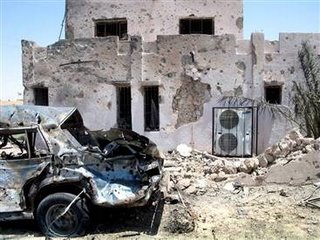In Iraq's desert, Sunni tribes battle Qaeda for control
 Anbar residents say the towns of Khalidiya and Haditha are effectively controlled by al Qaeda, who run Islamic courts, force women to wear an Afghan-style burqa and regularly dump bodies of those they call "traitors" and "spies" on the streets.
Anbar residents say the towns of Khalidiya and Haditha are effectively controlled by al Qaeda, who run Islamic courts, force women to wear an Afghan-style burqa and regularly dump bodies of those they call "traitors" and "spies" on the streets.RAMADI, Iraq, Sept 17 (Reuters) - Sheikh Sattar al-Buzayi summoned other tribal chiefs last week for a war council at his fortified home in Ramadi, the teeming, scarred capital of Iraq's Anbar province, desert heartland of the Sunni Arabs.
There was a bountiful feast of beef and rice, and a vow of unrelenting battle against the common enemy -- al Qaeda.
"We have to form police and army forces from among our sons to fight these al Qaeda militants," Buzayi, who says the militants murdered his father and his brother, told Reuters.
"We have now entered a real battle. It's either us or them."
Those words carry a powerful promise for U.S. commanders, who acknowledged last week they cannot defeat al Qaeda in its Iraqi bases on their own. They need Iraqi tribes -- Sunni Arabs like the al Qaeda militants themselves -- to take up the fight.
Those following Iraq's war from outside read mostly of sectarian conflict that pits the once-dominant Sunnis against the newly empowered Shi'ite government and U.S. troops.
But in Anbar the decisive battle is being fought within the Sunni community itself, between tribal leaders who still have clout among traditionally minded Arabs, and followers of Osama bin Laden's militant sect, who have seized power in towns on the banks of the Euphrates as it winds from Syria to Baghdad.
A young man who calls himself Abu Farouq, a senior al Qaeda figure in northern Ramadi, said his fighters want an Islamic caliphate in Anbar. Sheikhs like Buzayi are their enemy.
"We have the right to kill all infidels, like the police and army and all those who support them," he told Reuters.
"This tribal system is un-Islamic. We are proud to kill tribal leaders who are helping the Americans."
Read the rest at Reuters/Alternet
Related Link:
U.S. general sees Anbar fight as secondary to Baghdad
Relted Link:
Grim Outlook Seen in West Iraq Without More Troops and Aid

<< Home